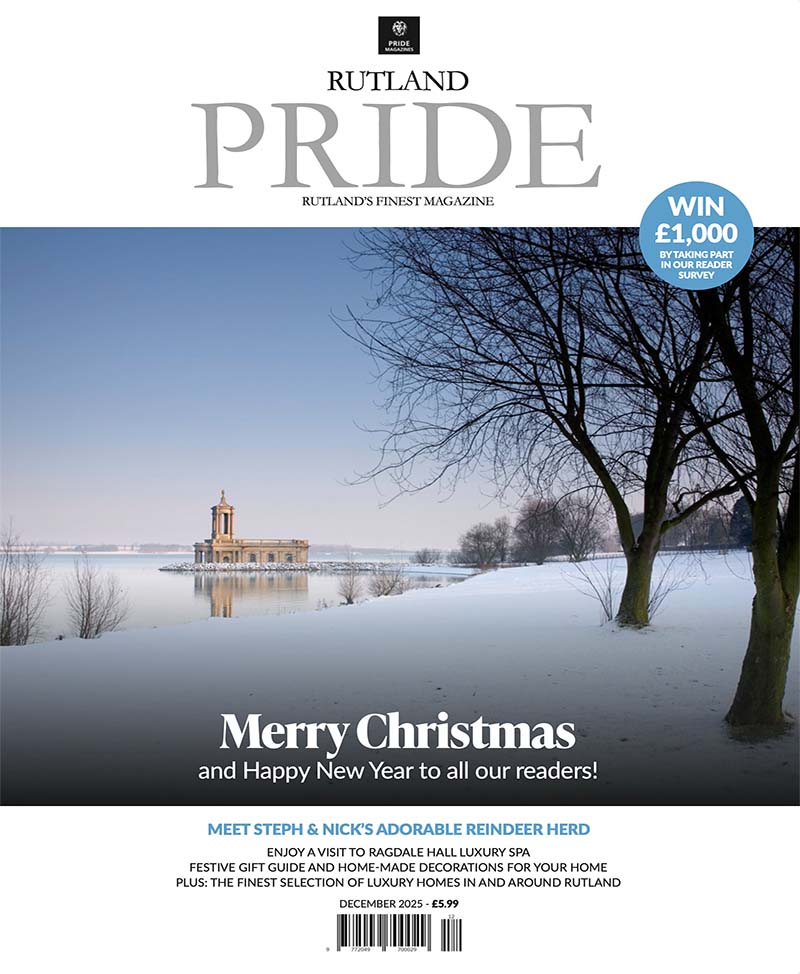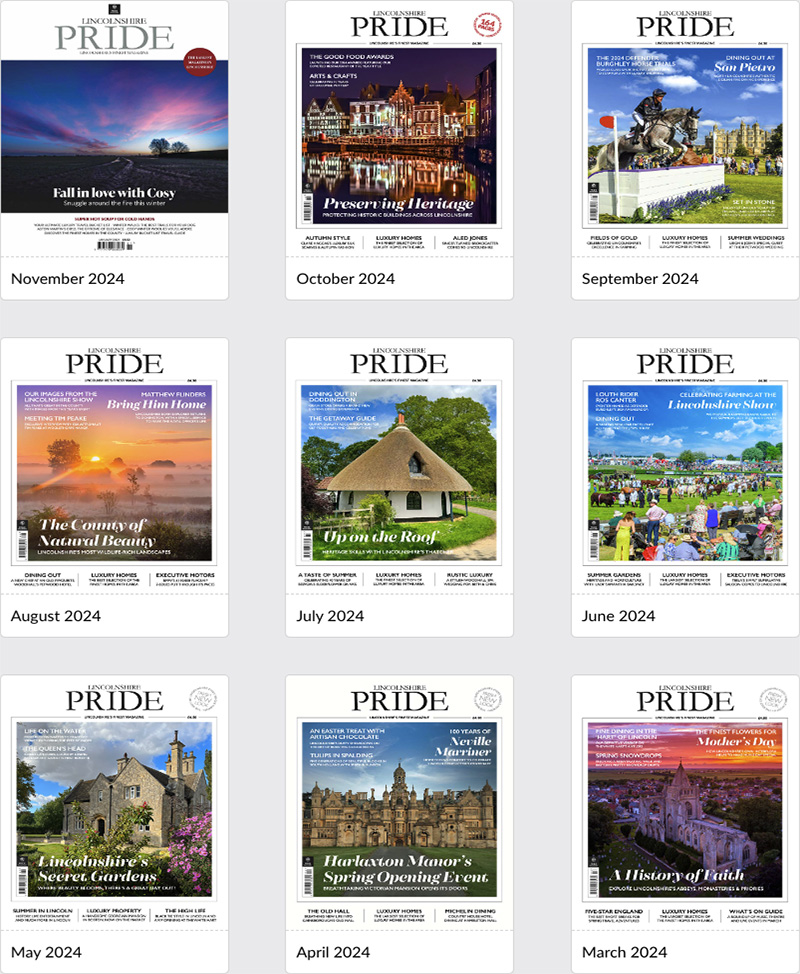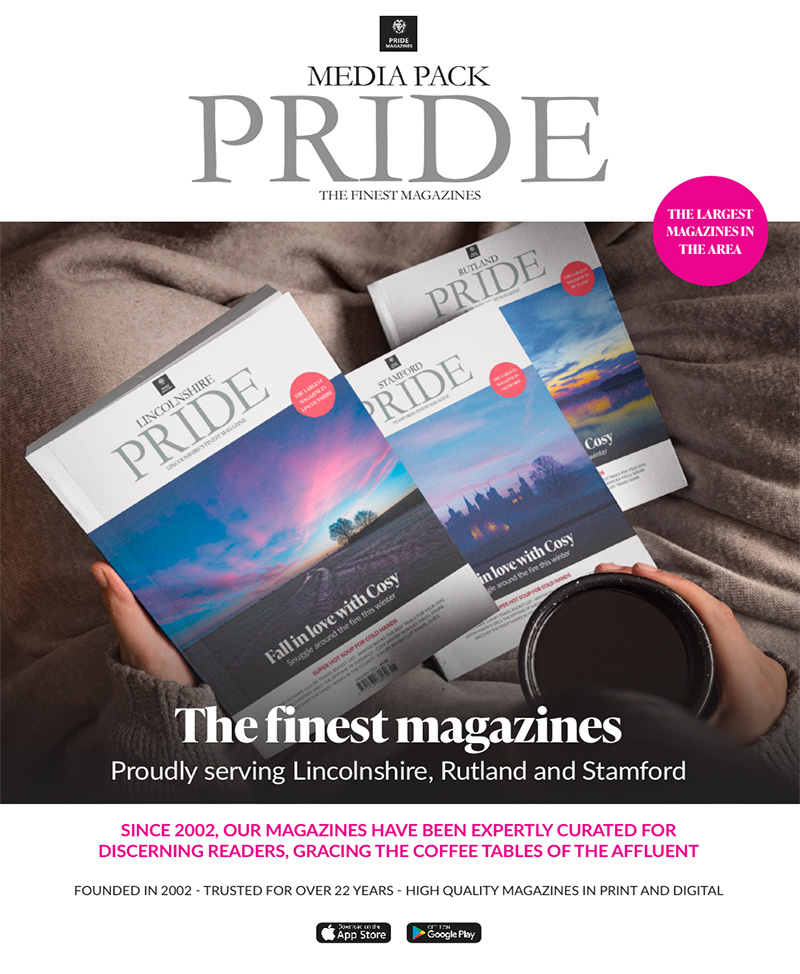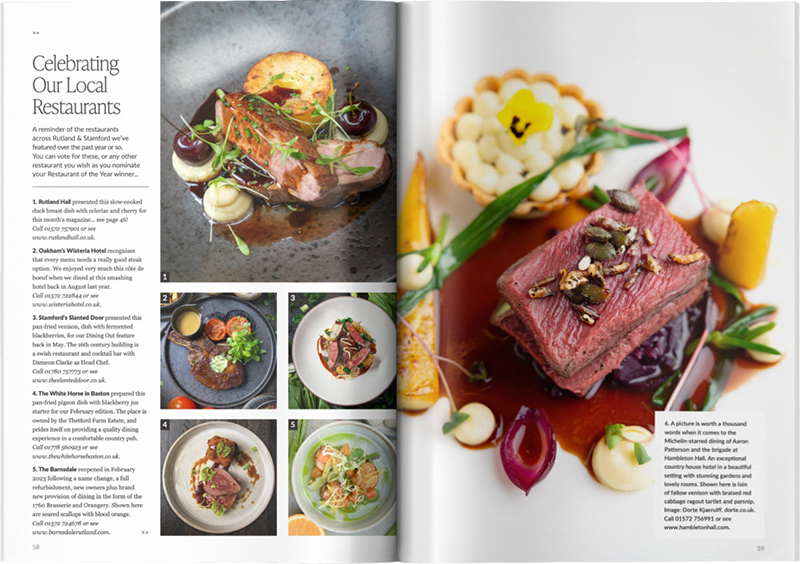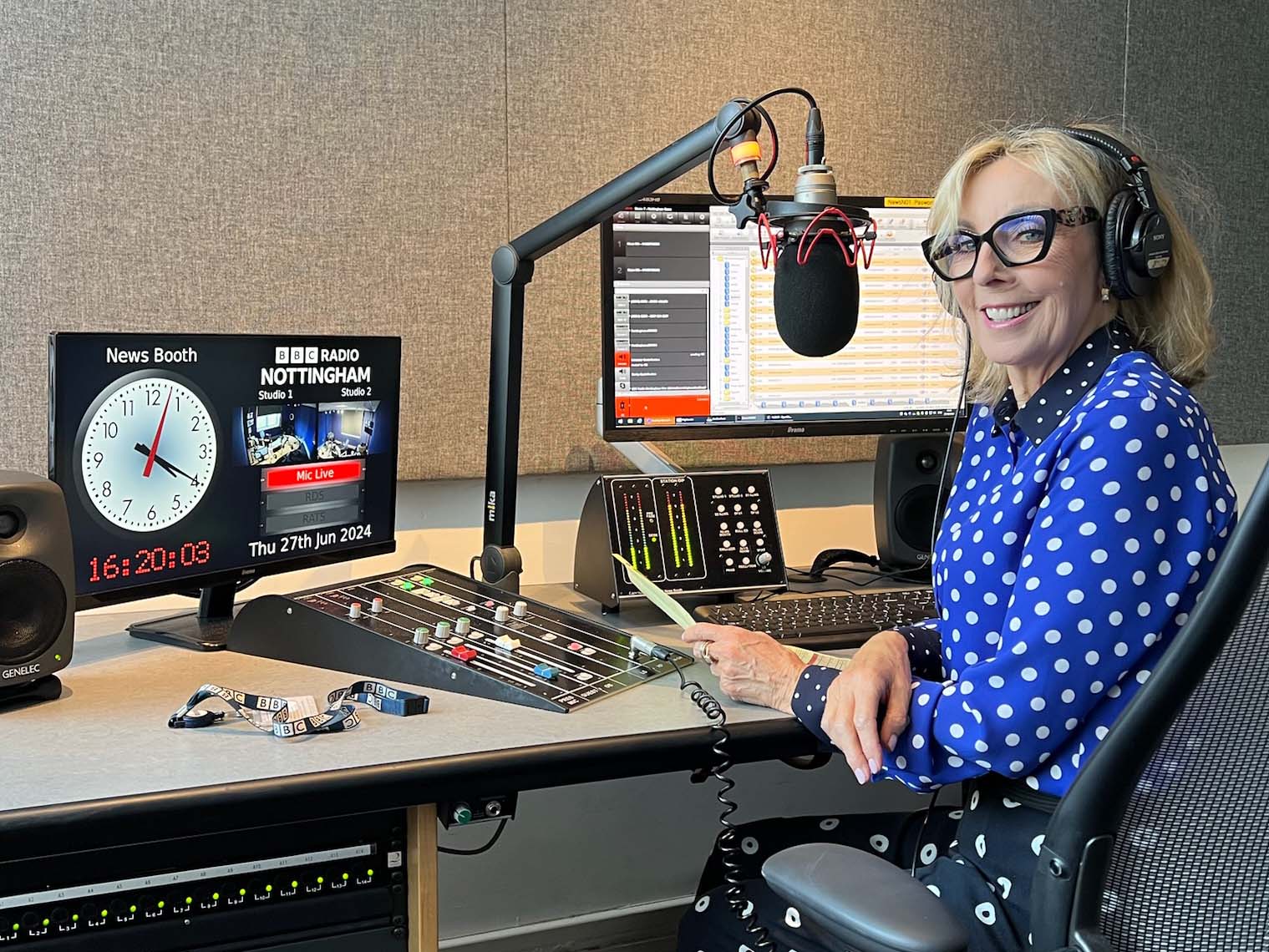
Anne Davies: 40 Year of Broadcasting
After four decades in TV and on the radio, Anne Davies is keen to instil her experience in the next generation of entrepreneurs and broadcasters across the East Midlands. This month we consider how representations of women in the media have changed with the host of the BBC’s East Midlands Today
As the saying goes, you only get one chance to make a first impression… in fact, we can be even more precise than that. Consultant psychologist and member of the British Psychological Society, Dr George Sik, observed in one study that in just seven seconds, someone that you’ve met for the first time has already made 11 observations about you, ranging from your financial standing, trustworthiness, your sexual desirability – and availability – and even your religion.
It’s a fact not lost on broadcaster Anne Davies, who has spent 40 years in the media presenting an unflappable persona in the face of tight broadcasting deadlines and news agendas that change with just minutes to go.
Anne has more recently turned her attention to mentoring anyone who needs to present or communicate to do so with confidence and authority, bringing insight from her work in TV and radio including roles as the presenter who launched GMTV in 1994 and her role as the face and voice of the BBC’s East Midlands Today evening broadcast from 2001.
“I was born in Surrey, lived on the Isle of Wight and then I went off to university at Aberystwyth to study English & Drama.”
“I started with the BBC in 1980 working on programmes like Panorama, Question Time and The Money Programme. I really loved television and wanted to be in a broadcasting environment, but when a presenting role began to appeal more and more, I ended up writing to every radio station in the country joining BBC Leicestershire.”
“There were no broadcast journalism courses then, but the BBC and ITV both offered fairly good training opportunities and upon joining Central, I began presenting the news for the channel’s afternoon bulletin at 3pm.”
Margaret Thatcher’s 1990 Broadcasting Act aimed to deregulate broadcasting, enabling independent broadcasters to compete for airtime. And, in 1993, independent production companies were keen to secure morning audiences. Breakfast TV had been established for a decade and the blend of hard news and magazine-style content was popular.
The changes followed the creation of a breakfast TV format which saw the launch of BBC Breakfast Time with Frank Bough, Nick Ross and an unknown Selina Scott.
ITV had launched their rival programme in the form of TV-AM, which ran until 1993, replaced on 1st January 1993 with GMTV. The latter outbid TV-AM to win the license for a breakfast broadcast, albeit by paying a rather eye-watering £34m for the privilege. Happily, the first broadcast saw Anne Davies sharing the sofa with Eamonn Holmes.
“It was great fun and it was a very exciting environment, a really wonderful time to be a broadcaster with launch parties and lots of people competing to fill our airtime.”
“In reality though, whilst Central had been a huge place with a wardrobe department the size of a warehouse, GMTV was really quite slim. The makeup room was a Portacabin and I remember it would shake every time someone walked down the corridor, meaning a makeup artist would have to pause the application of mascara.”
“The lighting wasn’t flattering either and the newsroom was accessed by a metal staircase. At Central I had a dressing room with a sofa and a makeup area and a bathroom. But at GMTV we had a tiny room that three of us shared and a constant flow of guests and people through the studio.”
Stating the obvious, broadcasting and the media in general is unrecognisable even since Anne returned to the BBC in 2001 to co-present East Midlands Today.
With all of the technology at their disposal, though, surely our modern journalists and broadcasters have never had it so good? Not necessarily, says Anne. “We broadcast from studios on Nottingham’s London Road and the size of the team is about 100, but we’re all interconnected multi-platform journalists responsible for output online, in radio and for TV. The development of technology has helped to reduce our equipment to this iPhone, and there’s less pressure to break a story online as you’ve the online platform upon which to break a story immediately.”
“But conversely, there’s added pressure in having to cover all different platforms, with good stills for online and updates when covering a story that evolves. The same is true of the news agenda generally, which tends to remain consistent throughout the day about three quarters of the time, but when a big story breaks, a modern audience expects you to use your technology to adapt quickly and ensure your output is up to date and dynamic.”
“And the BBC isn’t just a broadcaster. It’s a world leader. We try to be as impartial as possible and we check, cross check, we get stories checked legally… there’s so much fake news online, and as professionals we’ve got to be the authority, to maintain trust and to report everything accurately and in a really balanced way.”
“Reporting, too, has had to become more respectful of the people we speak to, and sensitive to their circumstances, irrespective of the need to establish facts or to meet a deadline.”
“Nobody wants to report anything harrowing and foremost in your mind is the person behind a story. Our reporting in 2007 of the disappearance of Madeleine McCann was the recipient of a Royal Television Society award, but as affirming as it was to have our professionalism recognised, we were never neglectful of the fact that a family’s life had been changed forever.”
“The same was true of our reporting of the Nottingham attacks in 2023 and when we were reporting during Covid, opening with data pertaining to the latest mortality figures. There’s a professional obligation to report sensitively, accurately and in a way which is respectful to those concerned.”
“And more broadly, you’ve a responsibility to be a friendly face, to leave a viewer with the feeling that they’re not alone. I remember my mother, when I was younger, remarking when a presenter once said ‘have a lovely Christmas’ that she was sick of hearing that because people come from all different walks of life and you could be the last person that somebody sees that evening.”
“The first thing I was told when I started in broadcasting was to always remember that you’re broadcasting to one person and one person only, listening to you on a grease-spattered radio in the kitchen that’s half tuned-in – so ‘get over yourself and don’t succumb to broadcasters’ machismo!’”
Another way that broadcasting has changed is with the BBC’s ambitions to recruit in a more representative way. Back in May 2018 the corporation launched its 50:50 challenge, which aims to achieve an equal split of male and female broadcasters, journalists and technicians.
That commitment was reaffirmed in 2021 and 2022, subsequently extended to include a commitment to recruit staff from black, Asian or minority ethnic backgrounds, as well as disabled staff and those from working class backgrounds.
The BBC’s audited figures in its Annual Report & Accounts published last year shows the corporation now has a workforce made up of 50.1% women, and 49% women leaders.
It’s rewarding news given that ITV last month confirmed that their Lorraine and Loose Women programmes would be cut to just 30 weeks a year, with the former reduced in duration to just 30 minutes.
This is a programme whose presenter, Lorraine Kelly, is a 65-year old woman, at the helm of a programme which was first to champion Dame Deborah James’s campaign for bowel cancer awareness.
It is also a far cry from broadcasting sofas of yore, reckons Anne. “We’ve changed as a society, and become commendably more sensitive to representations of gender. Perhaps we have more work to do, but when I started out the news presenter would be 50 or 60 years old and next to him on the sofa would be his female sidekick, aged 25.”
“It’s more balanced now, but the media is also a commercially challenging environment too, and I don’t know for sure about the circumstances of ITV’s decision, but I didn’t feel it was a dig at women. I imagine it was an editorial decision, and most broadcasts now are aimed at men and women equally.”
“Women are empowered to remain in their positions for longer though, and that’s a good thing – think of the BBC’s consumer affairs programme Rip-Off Britain fronted by Julia Somerville, Angela Rippon and Gloria Hunniford or Radio 4’s You & Yours headed up by Winifred Robinson. Everything on the age spectrum has shifted from when my grandmother at my age carried a handbag like the Queen and dressed conservatively, compared to today, when women in their mid-60s can wear really nice dresses, shop at Zara and present themselves with confidence.”
“Most satisfyingly, TV is a reflection of society, so to be part of a BBC that champions older professional women and projects that into the wider world is something I’m really proud of.”
That said, Anne also remains very conscious of empowering the next generation of not only broadcasters but professional women, across the East Midlands.
“Presentation, more broadly is about getting a better job, making your life better, projecting confidence and being an agent of authority.”
“I provide presentation coaching for the BBC and as an independent consultant, and much of my work is local because I genuinely do believe in the excellence of the East Midlands and I want people here to help showcase the talent we have, not just in broadcasting but across their own working lives and personal lives.”
Anne began offering communication and presentation classes a couple of years ago for anyone who wants to polish their skills from those with careers involving public speaking to people with jobs in sales or customer service.
“70% of the population admits to being terrified of standing up and speaking in public,” says Anne. “Good communication is essential for management positions, and the advice offered is as relevant to face-to-face interactions as for the video calls – Skype, Facetime, Zoom, Teams – to which we all became accustomed during the pandemic.”
It’s important to Anne that she can help not just aspiring broadcasters, but anyone in the East Midlands seeking to further their careers and present themselves with a sense of confidence akin to a broadcaster with 40 years of experience.
That’s not the only way that Anne is trying to help future entrepreneurs, managers or broadcasters’ personal development either. Ten years ago she founded Fashanne as a way of mentoring students seeking to establish a career in fashion and textiles in the region.
“Fashanne is a year-long programme which partners with a number of universities in the area providing a pathway into the industry via mentoring, workshops and internships, culminating in an annual live event.”
2025’s event will take place as Pride goes to press with 11 category winners chosen by a panel including lead judge Patrick Grant – Great British Sewing Bee judge and established Savile Row tailor – plus Giuliano Martello, menswear coordinator at Paul Smith and senior designers at retailer Next including Zeph Logan and Jonathan Pedley.
“Fashanne culminates in the show and the awards, but it’s a much more long-term programme, giving students contacts in the industry, confidence and a sense of self-worth.”
“It’s important for the students who participate but also important to reflect what we have here in the East Midlands.”
“Let’s be part of something that waves the flag and lets people know how great we are in the East Midlands… we’ve much to be proud of and that’s why it’s a pleasure to report not just on politics and hard news within the region, but also on the heartwarming and good news stories in the area too.”
“I work with an amazing team and for a world-leading broadcaster. It’s a privilege to appear on screen every night and the whole team is invested in representing the region in the best way we possibly can.”
Anne Davies is the presenter of BBC East Midlands Today, 6.30pm, weekday evenings. She also provides communication and presentation skills training, and is the founder of the Fashanne awards which nurtures upcoming talent in the fashion industry, see www.annedavies.tv.


